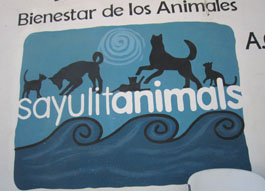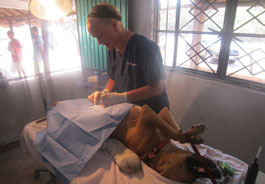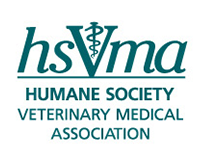Sayulitanimals: My Place of Practice Away from HomeHSVMA encourages veterinary professionals to offer their services to communities that don't have access to veterinary care due to cost and/or location. Read about one member's experience volunteering her time in Mexico. By Dr. Charlotte Burns, DVM, CVA August 8, 2013  Sayulitanimals is an animal welfare organization working to improve the lives of animals in Sayuita, Mexico. When I first learned that some veterinarians split time between practicing in their stateside jobs and traveling to do volunteer work in other countries, a light bulb flashed on in my mind—what a great idea! And when I discovered Sayulitanimals, I knew I had found the perfect volunteer opportunity. Sayulitanimals is a small animal welfare group based in Sayulita, a Mexican coastal town 45 minutes north of Puerto Vallarta. The organization was founded by Sara Briner, who recognized the intense need for assistance to the street animals of the area. Currently Sayulitanimals has four key programs: Free Spay and Neuter; Medical Aid for Street Animals: Adoption and Foster Assistance; and Community Education. I first became aware of the group when a colleague, Dr. Chris Holmes, mentioned that he began traveling to Mexico to offer his skills after one of his clients told him about Sayulitanimals’ need for a surgeon. I asked him to speak to our local veterinary medical association about his experiences, and he invited me along on his next trip to see the Sayulita work firsthand. At that time, their local veterinarian in Mexico had left so the organization needed even more help with their sterilization campaigns. Since graduating from UC Davis School of Veterinary Medicine in 2006, I’ve been working at a small animal hospital as well as at our local county animal shelter. I am part owner of Mendocino Animal Hospital in Ukiah, California, and I am also the Mendocino County Veterinarian. Besides spay/neuter issues, I also have an interest in Traditional Chinese Veterinary Medicine, and I received my acupuncture certification in 2009 from the Chi Institute. As a veterinary student, I became involved with HSVMA’s Rural Area Veterinary Services (HSVMA-RAVS) and had the opportunity to go on several spay/neuter trips throughout California during my four years of school. After graduation I was also able to join the group on a few trips and help coach the students as they learned the process of examining patients, talking to and educating clients, anesthetizing animals, performing surgery and keeping detailed medical records. I really loved the community outreach and sharing of knowledge that we experienced on these trips.  Dr. Burns performs surgery during a Sayulitanimals clinic. Finding and connecting with Sayulitanimals has been one of the best choices of my life. I am now the veterinarian for the organization’s sterilization clinics. I have traveled to Sayulita every three to four months since March 2010. Besides spaying and neutering animals during our clinics, we are given the opportunity to see other medical cases such as animals suffering with old, infected fractures who need amputations, animals requiring enucleations, and dogs who need treatment for transmissible venereal tumors (TVT) and the tick-borne rickettsial disease, Ehrlichiosis. We have also performed rabbit spays, stabilized malnourished iguanas, and treated multiple animals with chronic hit-by-car wounds. At first, the sterilizations we performed were primarily spay surgeries, but the number of requested castrations has increased over time. This is a testament to the strides we’ve made in our public education efforts. Our Sayulita trips usually last five to seven days. We fly down on the first day, do two to three days of surgery, and then fly back on the fifth day. Sometimes we squeeze a day or two of relaxation in at the end of our stay. Sayulita is a small beach town that has a wonderful mix of residents. It is still very quaint and you can easily walk around and run into new friends you have just made. The clinic we work at is very nice by local standards. It has four walls and a roof. The lighting is a little weak, but head lamps are very helpful. There is no inhalant anesthetic machine, which also means there’s no oxygen support if needed. We’ve provided an ”ambu” or ventilating bag in case of emergencies, but fortunately everything has gone smoothly so far. We use the effective injectable anesthetic TTD combination: Telazol, Torbugesic and Dormitor. During the campaigns, I’ve worked with local Mexican veterinarians, helping them improve their surgical skills and providing consultations on some of their tougher cases. Should they have a pressing case to discuss, I also make myself available to them by e-mail when I am back in California.
I consider myself very fortunate to work with three veterinary technicians who love coming to Sayulita to help with our clinics. They are RVTs Bliss Fisher, Denise Moroni and Barb Payne Templin. They take charge of organizing and monitoring anesthesia, while a host of local volunteers helps recover the animals and groom off the animals’ fleas and ticks. At certain times of the year in Sayulita, the topical parasites are so bad we’ve even resorted to spraying ourselves! Since we’ve been going to Sayulita on a regular basis, the local veterinarians are becoming more efficient at surgeries. This has freed us to take our show on the road, and so far we’ve conducted two mobile clinics in neighboring villages. My volunteer work with Sayulitanimals is a dream come true. I love my work and the clinic at which I practice at home in California, but I also really enjoy traveling outside my day-to-day world and helping make a difference in the lives of the animals and the people who live there.  Dr. Charlotte Burns with a Sayulita patient Charlotte Burns, received her BA in Biological Chemistry from Wellesley College in 1988. and her DVM degree in 2006 from UCDavis. She is also a 2009 graduate of the Chi Institute for Veterinary Acupuncture. Currently she is a partner in the ownership of Mendocino Animal Hospital in Ukiah, CA and the veterinarian for Mendocino County. Charlotte has a strong interest in spay/neuter campaigns and is a proponent of early spay/neuter in the shelter setting. Her trips to Mexico take her to Sayulita every few months to help Sayulitanimals. She is currently living in Ukiah, CA with her two dogs, Louie and Norman, and four cats, Squiggy, Lily, Willow and Cleo. |
